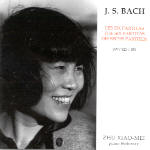Having had mixed reactions to Zhu Xiao-Mei’s Goldberg Variations (see my review, Quick Search Number 2160), I’m pleased to report that her Bach Partitas provide a constant source of delight. Her apt tempo choices and crisp, transparent touch underscore each movement’s dance origin. At the same time, Zhu’s outlook is essentially pianistic in her tapered phrases, multi-colored legato, and undulating dynamic contours. You don’t get the linear severity and structural rectitude of a Tureck or Gould, but that doesn’t matter. What imagination, warmth, intimacy, and heartfelt involvement Zhu brings to these wonderful works!–and her flexible, highly instinctive music making never fails to sing. She imbues the repeats with ingenuous, organically sprung variants of voicing and emphasis, though her ornamentation is relatively conventional. At times Zhu pushes her excellent technique to the limit in the C minor Partita’s Capriccio, or the Fifth Partita’s Gigue, which slows down from its initial tempo. But more famous pianists have done worse things. Zhu’s Bach Partitas pull you in, tell you stories, and leave you better off having heard them.
































